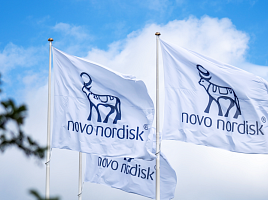기사본문
Changes of Genome & Company..Strategy for "Immunotherapeutics"
입력 2021-01-05 09:07 수정 2021-01-08 10:13
by Dongyoung Park

Microbiome-based drug developing Genome & Company challenges the field of developing new-target immunotherapeutics. Last January, Genome & Company concluded an agreement on the supply of immunotherapeutics — Pfizer's Bavencio (Avelumab) and on cooperation of clinical trials for the co-administration of its own new microbiome drug, GEN-001. Last August, intending to expand its technological platform and business foundation for the development of new microbiome drugs, the company acquired Scioto Biosciences, that holds the platform of activated-bacterial therapeutics (ABT) technology, which boosts microbiome efficacy.
At the turning point to this change, Genome & Company invited Ms. Miyoung Cha, its research-laboratory head, to lead the development of new-target immunotherapeutics. Ms. Cha majored in biochemistry and was involved in the development of bispecific-antibody-implementation of good manufacturing practice (GMP) and technological transfer while working in Hanmi Pharm. Co., Ltd. Genome & Company passed the preliminary examination for listing in KOSDAQ last October and listed in KOSDAQ last year.
Ms. Cha stated, “Many pharmaceutical companies are interested in the excavation of new-target drugs, however their development involves a big risk, and developing a validation process capable of verifying the efficacy of the new drugs, is difficult . I have joined with Genome & Company for the development of new immunotherapeutics based on the new-target excavation platform, GNOCLE™ .”
Genome & Company built the GNOCLE™ platform for developing new-target immunotherapeutics based on clinical data in hospitals. Securing a vast amount of data from patients in a research-oriented hospital will enable this platform to target and verify new therapeutics. Based on this platform, Genome & Company excavated two lead programs: regulatory B cell (Breg) targeting GENA-105 and T cell targeting GENA-104. Ms. Cha explained the results of the preclinical trial of GENA-104 at a meeting with reporters from Biospectator.
GICP-104 aggressively attacks cancer cells and inhibits the activity of T cells by combining with their GICP-104 receptors. Genome & Company intends to induce the apoptosis of cancer cells through the GENA-104 antibody that combines specifically with GICP-104 and activates T cells.
Above all, the effect on cancer cells in patients' tissues was examined to identify the presence of clinical relevance to GENA-104. Immunohistochemical analyses of the tissues of many cancer patients were carried out, and more than 80% of GICP-104 was found in gastric, pancreatic, endometrial, liver, gallbladder, and prostatic cancers, as well as melanomas (≥1+). Ms. Cha stated, “ Currently, GENA-104 is being developed to target carcinomas, such as gastric cancer, that excessively manifest GICP-104, and the scope of diseases for which the medicine is efficacious will be expanded further.”
Next, the antineoplastic efficacy and the developability of GENA-104 as an immunotherapeutic agent were identified in the preclinical trial. Results of the trial revealed the CD4, CD8+ T-cell inhibition of GICP-104 to be higher than that of PD-L1 (Atezolizumab). These results showed the potential of GENA-104 to manifest higher antineoplastic efficacy than PD-L1, the existing immune-checkpoint inhibitor.
The antitumor effect of GENA-104 was examined in the in vivo mouse model of syngenic colon cancer (CT26), and it inhibited the growth of tumor dose-dependently. The antitumor effects of GENA-104 and PD-L1 were compared in the same in vivo mouse model, and GENA-104 inhibited tumor growth more than injections of the same concentration of PD-L1.
Ms. Cha, stated, “The therapeutic dosage for sole administration of GENA-104 is being developed primarily. . . for future co-administration with diverse kinds of immunecheckpoint inhibitors, including PD-1/L1.” Ms. Cha also stated, “We are currently optimizing the candidate material for GENA-104. Upon selection of the final candidate material, the clinical trial for GENA-104 is scheduled to begin in the second half of 2023, . . . and we intend to acquire the license after completion of this clinical trial .” She added, “In the same year, we will apply for the clinical trial (IND) for GENA-105 targeting the regulatory B cell that inhibits the activity of T cells, with the intention of adding two pipelines.”
In the meantime, Genome & Company concluded an agreement of CDO(Contract Development Organization) with Samsung Biologics on December 9, 2020, for the development of production cell line, GENA-104 production and process development.







